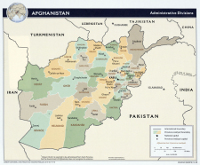Coalition and Afghan forces killed a senior Taliban leader and targeted another during operations over the past several days in the northwestern Afghan province of Badghis.
On Oct. 9, a combined Coalition and Afghan special operations team killed Mullah Jamaluddin, who was described by the International Security Assistance Force as “one of the possible candidates to become the new shadow governor for Badghis.”
Jamaluddin was in the running to succeed Mullah Ismail, the Taliban’s shadow governor of Badghis province who was killed along with Abdul Hakim, a senior military commander, during a raid on Oct. 6. Jamaluddin “facilitated the improvised explosive device and weapons movement throughout Badghis province,” ISAF stated.
Coalition and Afghan forces are also seeking to confirm that another senior commander in Badghis was killed on Oct. 12 during a raid in the neighboring province of Herat. Several Taliban fighters were killed during the raid, and multiple weapons, including a suicide vest, were recovered after the operation.
The commander, who was not named, leads Taliban forces in the districts of Qal’ah-ye Now, Murghab, and Muqor, and “is responsible for attacks against Afghan and coalition forces, as well as kidnapping operations,” ISAF stated. “He also reportedly planned and directed a recent ambush that killed two Spanish soldiers.”
Coalition and Afghan forces have stepped up operations against the Taliban in Badghis and neighboring Faryab province, a region that has seen an uptick in Taliban activity over the past five years. Qari Ziauddin, the shadow governor for Faryab province, was killed in a “precision airstrike” on Oct. 5.
Badghis is a Taliban hub for operations in the northwest
The Balamurghab district serves as the Taliban’s main operations hub for northwestern Afghanistan. Taliban commanders in Badghis have claimed to have 74 bases scattered throughout the Balamurghab district alone. Both Balamurghab and the neighboring district of Ghormach are considered to be under Taliban control. US, Spanish, Italian, and Afghan forces now maintain a presence in the Balamurghab district at Forward Operating Base Columbus.
Badghis is critical to the Taliban’s northern front. The Taliban are attempting to isolate the province by keeping the instability high so that the paved section of the northern ring road cannot be completed. The Taliban want to use their safe havens in Badghis to launch attacks against neighboring Faryab province and eventually Mazar-i-Sharif in Herat.
Coalition and Afghan forces have been targeting the Taliban in Badghis for years. In February 2009, Mullah Dastagir, the Taliban’s shadow governor for Badghis, was killed in an airstrike along with several aides and fighters. Coalition and Afghan forces battled the Taliban throughout 2008 and early 2009 but have been unable to dislodge them from strongholds in the two districts.
An al Qaeda affiliate also operates in Badghis
The al Qaeda-linked Turkistan Islamic Party is also known to operate in Badghis province. In January 2010, a US airstrike in the village of Khatawaran in Balamurghab killed 13 Uighurs and two Turkish members of the Turkistan Islamic Party.
The Turkistan Islamic Party, which is also known as the Eastern Turkistan Islamic Party or Eastern Turkistan Islamic Movement, operates primarily in China’s western province of Xinjiang as well as in the Central Asian republics. The group seeks to establish an Islamic state in the region. The Turkistan Islamic Party has training camps in Afghanistan and Pakistan and is known to operate in both countries.
The Turkistan Islamic Party has been designated as a terrorist organization by the United Nations, the United States, China, Kazakhstan, and Pakistan.
Abdul Haq al Turkistani, the former leader of the Turkistan Islamic Party, was closely linked to al Qaeda and Osama bin Laden. Haq, who is also known as Maimaitiming Maimaiti, became the leader of the terror group in late 2003 after Hassan Mahsum, the group’s previous leader, was killed in Waziristan, Pakistan. Haq was appointed a member of al Qaeda’s Shura Majlis, or executive council, in 2005, according to the US Treasury Department, which designated him as a global terrorist in April 2009. The United Nations also designated Haq as a terrorist leader.
Haq was killed in a US Predator airstrike in North Waziristan on Feb. 15, 2010.









3 Comments
That section of the ring road appears to forever ‘just about to be completed.’
http://www.youtube.com/watch?v=YVkJ3eJsERo
Here is an alternate opinion:
http://kabulpress.org/my/spip.php?article4093
Matthew J. Nasuti maintains that road projects are NOT a boon to Afghanis, that they become enemy assets very quickly.
I must agree with him. Our typical project is hijacked by the Taliban and used to extract taxes by them.
Hydro-electric power for Kandahar is a case in point.
Most of the civil improvement projects we have in mind are carts before horses.
And, on the whole, no one should be loaning any money to Afghanistan: it needs to be given away — and monitored as it is dispensed.
The typical smart Afghan is a rare bird — and plainly sees that it is in his best interest to make a fat score and get out. It will take entire life-times before Afghanistan becomes a nation-state with anything like the norms of Iraq or Iran — if ever.
This, then means that our focus should be on the anti-islamist campaign and to scale back our modernization programs. The plan should be to not make things worse.
That this province has thwarted the ring road may mean they really don’t want it.
What’s the overall picture? Now that the coalition is killing scores of talis & al quedas.
In Khaled Hosseini’s fine movie the Kite Runner, set primarily in Afghanistan, the main figure’s father Baba was giving a large monetary contribution to a local official. After the man left, Baba’s friend Rahim looked at him and said that the man would end up stealing half of the money. At that point, Baba said, “What, are they getting lazy?”